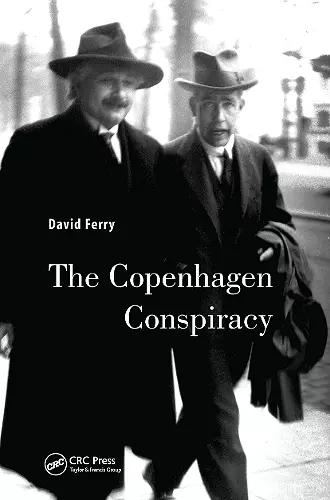The Copenhagen Conspiracy
Format:Hardback
Publisher:Pan Stanford Publishing Pte Ltd
Published:2nd Jan '19
Currently unavailable, and unfortunately no date known when it will be back

At the close of the nineteenth century, we stood on the threshold of one of the greatest periods of science, in which the entire world and understanding of science would be shaken to the core and greatly modified. This explosion of knowledge led ultimately to that same information revolution that we live in today. Planck and Einstein showed that light was not continuous but made of small corpuscles that today we call photons. Einstein changed the understanding of mechanics with his theory of relativity: airplanes became conceivable; radio and television blossomed; and the microelectronics industry, which drives most of modern technology, came into being. New areas of science were greatly expanded and developed, and one of these was quantum mechanics, which is the story to be told here. Yet, the development of quantum mechanics and the leadership of Niels Bohr have distorted the understanding of quantum mechanics in a strange way. There are some who would say that Bohr set back the real understanding of quantum mechanics by half a century. I believe they underestimate his role, and it may be something more like a full century. Whether we call it the Copenhagen interpretation, or the Copenhagen orthodoxy, it is the how for the continuing mysticism provided by Mach that is still remaining in quantum mechanics. It is not the why. Why it perseveres and why it was forced on the field in the first place is an important perception to be studied. In this book, I want to trace the development of quantum mechanics and try to uncover the why.
This book is largely a history of quantum mechanics that concentrates on various physical and philosophical interpretations of the theory. The various controversies that have arisen over the last century are well covered, as is the centrality of the Einstein-Bohr debate, which permeates much of the discussion. Ferry (Arizona State Univ.) concludes the text by arguing that "what Neils Bohr did, with his positivist conspiracy ... set back the understanding of the foundations of quantum mechanics, now by more than a century." Ferry is also clear that the quantum debate really does not matter if all one wants to do is calculations or find solutions to particular problems. However, it makes a difference if one wishes to fundamentally understand quantum mechanics' meaning. Ferry writes engagingly; chapter notes provide the reader with connections to primary and secondary sources. This book would complement academic collections in the history, philosophy, and interpretation of quantum mechanics.
Summing Up: Recommended. Advanced undergraduates and above.
--A. M. Strauss, Vanderbilt University
ISBN: 9789814774758
Dimensions: unknown
Weight: 811g
384 pages